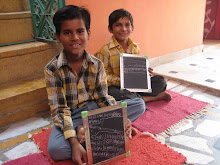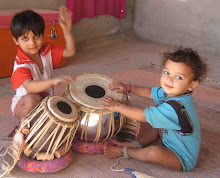There are a few things that make every trip to The Merasi School complete: a knock-down, dragout bout of food poisoning, an unanticipated interaction with a curious cow, and becoming the landlord to a rapidly proliferating community of lice. The first two I proudly checked off my list the other week, leaving the last and final lingering quietly in the shadows, waiting to pounce. And pounce it did, today at about 2pm.
Let me set the scene: I'm sitting in the classroom for Very Little Class, the youngsters still learning about ABCs and the importance of relieving yourself anywhere but on the rug. As is usually the case, the school house is jumping with kids cleaning slates, kids scrubbing walls, kids writing on walls, and the occasional roving dog. Fridah, a big-hearted girl from a small village outside Jaisalmer wandered into the classroom and began to play with my hair, a somewhat vicious activity not for the faint of heart, entailing grabbing, tugging, digging, and then, unsatisfied with the result, repeating.
After a few blissful seconds of having my scalp massaged with the caressing touch of a steampump, Fridah gleefully exclaimed, "Lice, Caitie! Big, BIG lice!" she held her hands about four feet apart to demonstrate the size of my new not-so-little tenants. Not wanting to comprimise a real time learing opportunity, I grabbed the chalkboard and began an impromptu lesson with Fridah on the Silent E, as manifested in lice, nice, twice, and splice, as several young girls combed through my once lusterous locks.
Lice is on the kinder spectrum of health issues facing our young ones at The Merasi School. Dehydration, malnutrition, and starvation are the fiercer evils that challenge that possibility and scope of Fridah and so many others' lives. As Sarwar and I look to expand and enrich our curriculum, relevant health education appears on the forefront of our priorities. Without basic knowledge about your body, a common cold can be as terrifying and feel as threatening as malaria. But knowledge comes in many forms, not only edification. We want a proactive kind of knowledge that instills in kids the tools to create environments and atmospheres where these health issues are a thing of the past.
So my lice and I sign off with a renewed commitment to the importance of education in all its forms for not just preventing disease and illness, but blowing the roof off the constrictive social casing that created these contexts in the first place.
Subscribe to:
Post Comments (Atom)


No comments:
Post a Comment